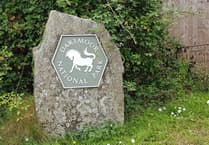A funding bid to develop a business case for re-opening the railway between Tavistock and Plymouth has been submitted by Devon County Council.
The authority is bidding for a grant from the Ideas Fund of the Restoring Your Railway programme, with the funding, if successful, used to produce a Strategic Outline Business Case and update extensive survey work already undertaken on the route.
The project will aim to reinstate the disused rail line between Tavistock and Bere Alston, providing hourly rail services through to Plymouth, as well as opening a new single platform railway station at Tavistock next to the 750 dwelling development under construction.
Two-hourly services between Plymouth and Gunnislake would be maintained.
The long-held ambition of re-opening the link between Tavistock and Plymouth is to encourage people to use rail services, helping to ease congestion on the A386 and reduce carbon emissions, as well as boosting access to employment, education and healthcare for residents in Tavistock and West Devon, providing better access to Dartmoor National Park, while increasing rail services will also benefit the communities of St Budeaux, Keyham and Devonport in Plymouth with more frequent city connections.
The reinstatement of the rail line to Tavistock is identified in the 20-year plan of the Peninsula Rail Task Force, highlighting it as a key second phase for the Northern Route between Plymouth and Exeter via Tavistock, following on from the planned reinstatement of services between Okehampton and Exeter.
The route is almost intact to Bere Alston where it joins today’s Tamar Valley Line between Gunnislake and Plymouth, with an engineering assessment in 2009 showed that the rail-bed, bridges and tunnels between Bere Alston and Tavistock were in sound condition, and the funding bid though, as part of the Restoring Your Railway Fund, would help further develop the business case for the reopening.
Cllr Andrea Davis, cabinet member for climate change, environment and transport, said: “Reinstating this rail link is vital to support growth in Devon and to help reduce carbon emissions.
“We’ve submitted a strong bid for funding to help us work up an outline business case. We’ve already undertaken feasibility studies, conceptual design and operational planning with technical support and advice from GWR and Network Rail.
“The Department for Transport has recognised that a lot of work has already been carried out to develop the Tavistock to Plymouth rail link and we’re hopeful they’ll help us progress this scheme further.”
Cllr Debo Sellis, county councillor for Tavistock, added: “Devon County Council is looking to the future with the reinstatement of this rail link.
“Listening to many young residents it is clear they want their future to have less reliance on the motor car, however it may be powered.”
And Cllr Philip Sanders, county councillor for Yelverton Rural, said: “Our road network cannot continue to absorb the increasing number of vehicles seeking to use it every day. In a rural ward such as mine access to private transport is currently essential but we must find a way to decrease this dependency.
“I’m very keen to support this initiative for a rail link to Plymouth from Tavistock which will undoubtedly be a significant step forward in this process. It will not solve all of the current issues on the A386 but it will be a step towards reducing carbon emissions and dependency on the road network.”
Future phases of the project could also enable an extension of the service to Ivybridge and the re-opening of a station at Plympton, and Devon County Council is hoping to hear later this summer if its bid has been successful.
The former Tavistock North station opened in June 1890, but closed on May 6, 1968, as part of the Beeching Axe.
The Tamar Valley Line remains open, and only escaped closure, except for the section between Gunnislake and Callington, because the roads in the area were so poor.
The station building in Tavistock has been restored and converted into three self-catering cottages, while the stationmaster’s house is being restored as a private dwelling, and the goods yard is now known as Kilworthy Park, and houses the offices of West Devon Borough Council.
Land, as part of Bovis Homes’ 750 home development being constructed at Callington Road, has been set aside for the potential provision of the new railway station, as part of the planning agreement.




